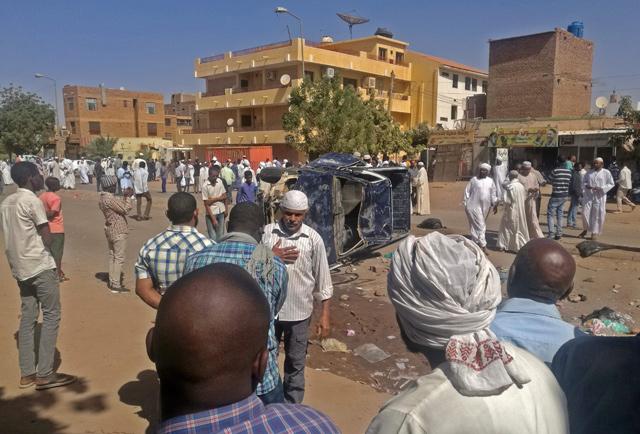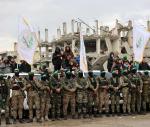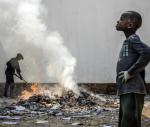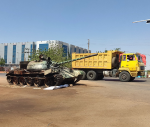You are here
Sudan police fire tear gas as organisers call nationwide protests
By AFP - Jan 12,2019 - Last updated at Jan 12,2019
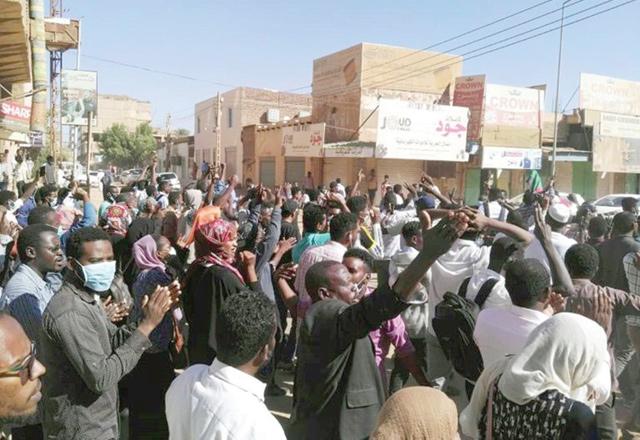
Sudanese protesters chant anti-government slogans during a demonstration in the capital Khartoum on January 6 (AFP photo)
KHARTOUM — Sudanese police fired tear gas at protesters in the capital Khartoum and its twin city Omdurman after midday prayers on Friday as organisers urged nationwide demonstrations over the coming week against President Omar Al Bashir.
Crowds chanting ‘‘freedom, peace, justice’’ demonstrated in two parts of Khartoum and in Omdurman just across the Nile, witnesses said.
They were quickly confronted by volleys of tear gas from riot police.
Video footage appearing to show worshippers chanting anti-government slogans inside a Khartoum mosque spread online on social media later Friday. The footage could not be independently verified.
Friday's protests came after organisers called for nationwide demonstrations over the coming week demanding Bashir's resignation.
Protests that first erupted on December 19 over a government decision to triple the price of bread have swiftly escalated into broader demonstrations widely seen as the biggest threat to Bashir's rule in his three decades in power.
‘‘We will launch a week of uprising with demonstrations in every Sudanese town and village,’’ the Sudanese Professionals' Association said.
The association called for a major rally in the Khartoum North neighbourhood on Sunday, to be followed by further demonstrations in the capital during the week.
The call to take to the streets was backed up by several opposition groups.
The authorities say at least 22 people, including two security personnel, have been killed during the protests, but rights groups have put the death toll much higher.
Human Rights Watch said on Monday that at least 40 people have been killed, including children and medical staff.
The European Union said Friday that the ‘‘use of force by security forces against civilians — including the use of live ammunition — has led to further casualties over the last few days’’.
It insisted ‘‘all sides should exercise restraint’’ and said authorities should release those detained over the protests, warning that the government's actions would impact bilateral ties.
Sudan's National Human Rights Commission condemned the killing of protesters ‘‘by bullets’’ and demanded an official investigation, in the first acknowledgement by a state body that live ammunition has been used.
The commission, which is appointed by the president, did not say who had fired the deadly rounds.
Economic crisis
Although the immediate trigger for the protests was the price of bread, Sudan has been facing a mounting economic crisis over the past year, led by an acute shortage of foreign currency.
Repeated shortages of food and fuel have been reported in several cities, including the capital Khartoum, while the cost of food and medicine has more than doubled.
Bashir and other officials have blamed Washington for Sudan's economic woes.
Washington imposed a trade embargo on Khartoum in 1997 that was lifted only in October 2017. It restricted Sudan from conducting international business and financial transactions.
The foreign currency shortages began with the 2011 secession of South Sudan, which took with it the bulk of Khartoum's oil revenues.
But critics of Bashir say his government's mismanagement of key sectors and its huge spending on fighting ethnic minority rebellions in the western region of Darfur and in areas near the South Sudan border has been stoking economic trouble for years.
The president has remained defiant, telling thousands of loyalists at a Khartoum rally on Wednesday that his government would not give in to economic pressure.
‘‘Those who tried to destroy Sudan... put conditions on us to solve our problems, I tell them that our dignity is more than the price of dollars,’’ Bashir said.
Human rights groups say more than 1,000 people have been arrested since the protests began, including opposition leaders, activists and journalists as well as demonstrators.
Analysts say the challenge for organisers is to get protesters onto the street in numbers.
‘‘Right now, some of the opposition groups and trade unions are trying to mobilise more protests, and probably they are thinking of how to escalate,’’ said Matt Ward, senior Africa analyst at Oxford Analytica.
‘‘But so far there hasn't been an escalation, they are persistent but they haven't risen in intensity in a significant way.’’
Related Articles
KHARTOUM — A group that is spearheading anti-government protests across Sudan on Saturday said it plans to launch more nationwide rallies ov
KHARTOUM — Sudanese police fired tear gas on Sunday at protesters ahead of a planned march on parliament in Omdurman, the twin city of
KHARTOUM — Sudanese police fired tear gas at protesters defying a nationwide state of emergency on Thursday, with demonstrators rallying in


